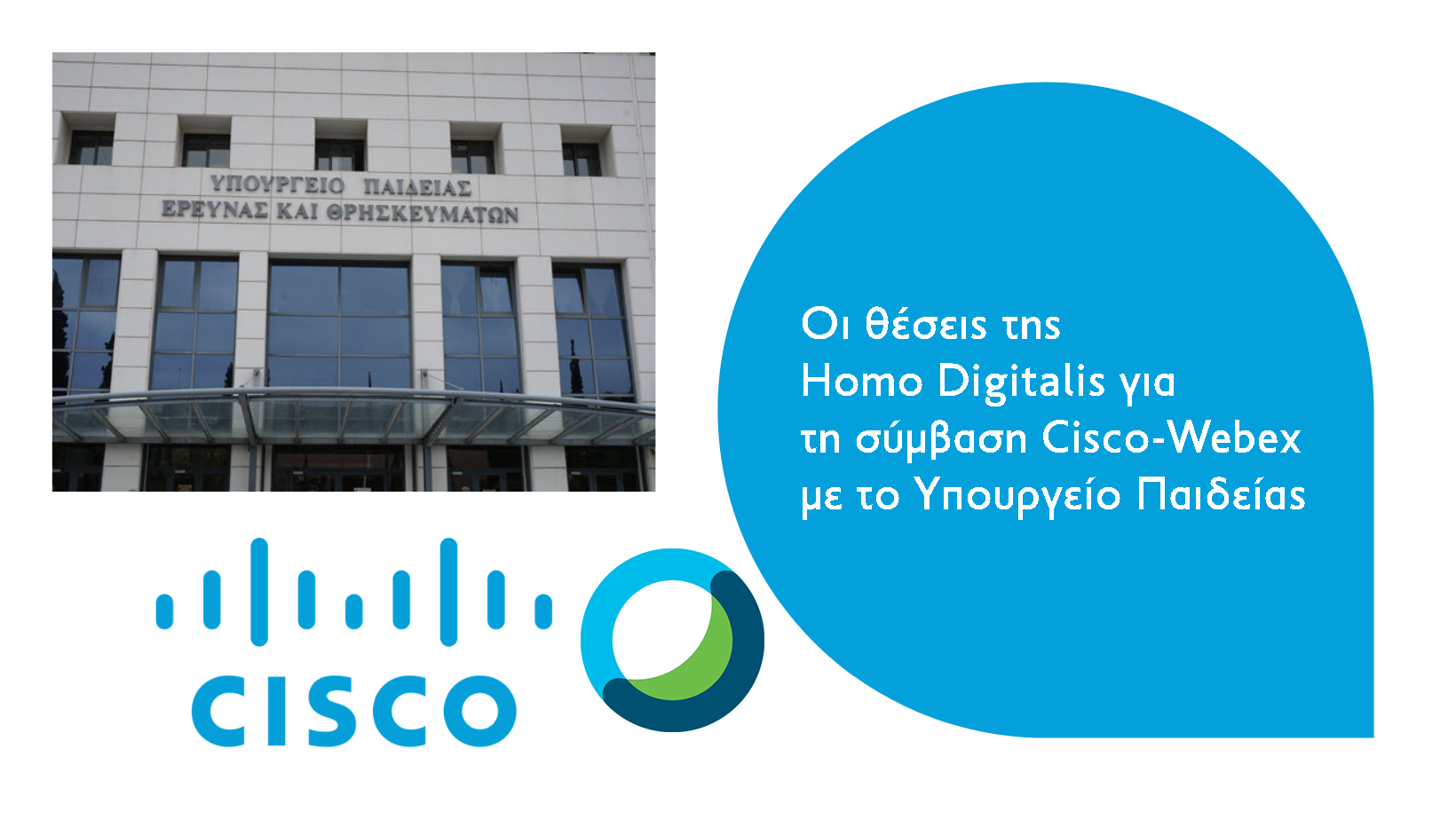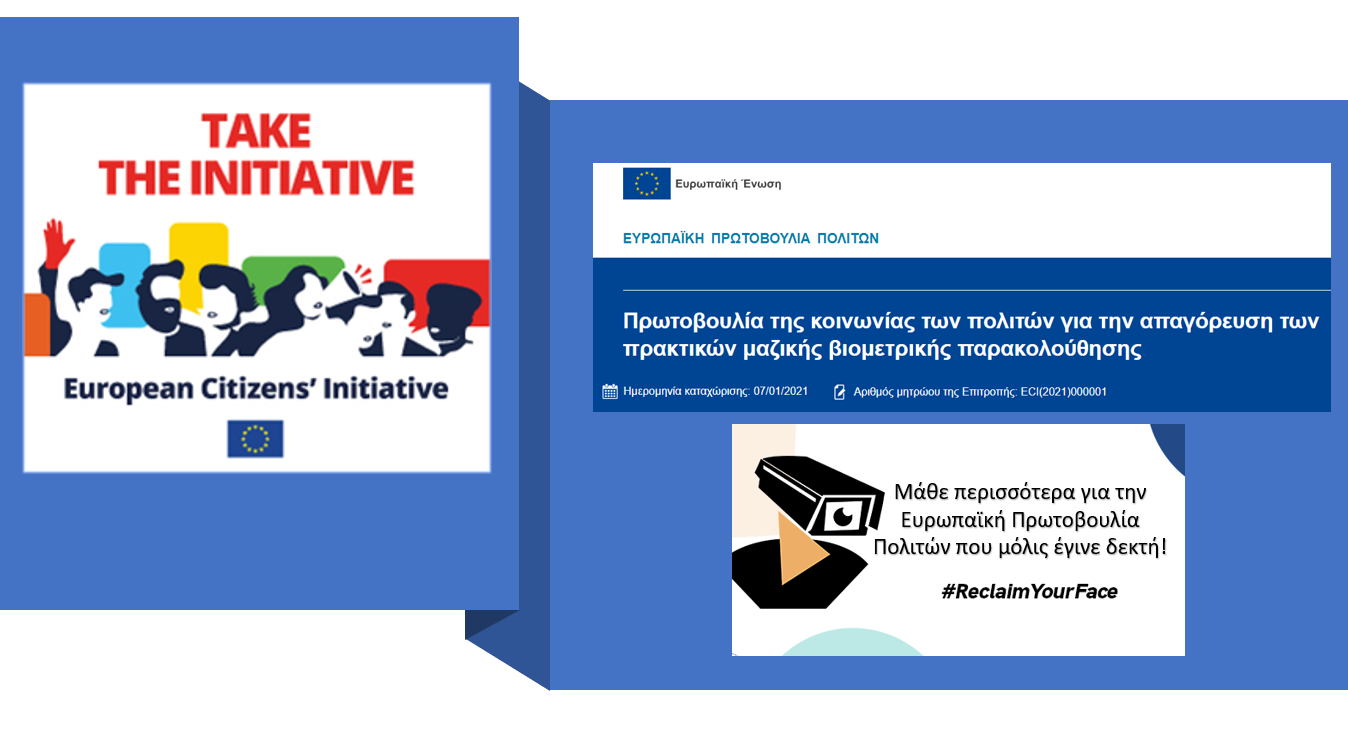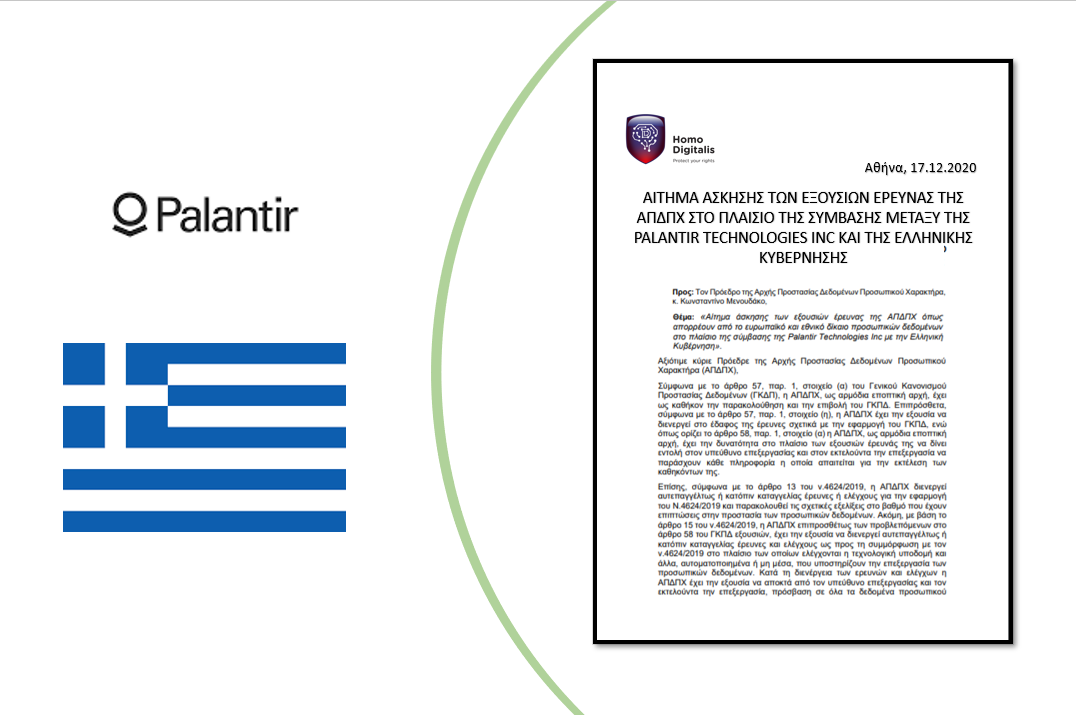Homo Digitalis participates in an event by KeFiM
January 28th is European Data Protection Day. On that occasion, the Centre of Liberal Studies (‘KeFiM’) (link in Greek) organized on January 27th a webinar on “Privacy Challenges in Times of Pandemic”.
Konstantinos Kakavoulis presented the issues that arise regarding citizens’ privacy during the pandemic. He shared the panel with Giannis Kalantzakis, KeFiM’s Data Protection Officer, in an excellent discussion moderated by KeFiM’s president, Alexandros Skouras.
The event is available to watch here (in Greek).
Homo Digitalis at the event "Big Data, Democracy and Digital Rights"
Homo Digitalis was invited to the event “Big Data, Democracy and Digital Rights” organised digitally by the Network for the Democratic Reform of the State-Via Publica.
The organization was represented by Konstantinos Kakavoulis.
A very interesting three-hour discussion was also attended by:
– Stefanos Loukopoulos, Co-Founder and Executive Director of VouliWatch.
– Mr. Haris Papaevangelou, PhD, Researcher of online platforms & social media
– Babis Polychroniadis, Journalist
– Andreas Panagopoulos, Journalist
The discussion was moderated by Mr. Christoforos Vernardakis, Member of Parliament for Athens.
Translated with www.DeepL.com/Translator (free version)
Homo Digitalis comments on the Cisco-Ministry of Education contract
Following the publication of both the original contract for the provision of modern distance education between the Ministry of Education & Religious Affairs and Cisco, and its subsequent amendments, Homo Digitalis makes known its comments on the protection of personal data, as guaranteed by the contract and in the process of providing distance education services.
It should be noted that the comments relate exclusively to the scope of the organisation’s activities, namely the protection of digital rights, and do not extend to comments on the procedure for signing the contract or its subsequent notification.
Homo Digitalis’ comments are available here.
Important positions on issues related to opacity and non-publication of the contract, as well as regarding violations of the Parliament’s Rules of Procedure have been published by Vouliwatch, which focuses its actions on promoting open government, and enhancing transparency and accountability of public bodies.
Read in detail the Vouliwatch’s well-founded comments here.
Homo Digitalis participates in the Legal Frameworks Group of CAHAI
Today, the Legal Frameworks Group of the Council of Europe ad hoc Committee on AI (CAHAI) had its first meeting. LFG is mandated to ensure that the CAHAI’s deliverables, such as the main elements of a legal framework for the development, design and application of artificial intelligence based on the CoE standards on human rights, democracy and the rule of law, include concrete text proposals in the form of possible legal instrument(s). The LFG should complete its work by December 2021. Ms. Peggy Valcke (Belgium) και Mr. Riccardo Villa (Italy) were elected as Chair and Co-chair of the LFG, respectively.
Homo Digitalis has the great honor to be part of this Group represented by one of our co-founders, Eleftherios Chelioudakis.
You can read the draft agenda and get informed about LFG and the other groups of CAHAI in its official website.
Homo Digitalis participates in CPDP 2021
On Monday the 29th of January, Homo Digitalis had the great pleasure and honor to participate in Computers, Privacy & Data Protection (CPDP) 2021. The panel in which we participated, was organised by MATIS Project and its moderator was Mr. Juraj Sajfert from the Vrije Universiteit Brussel.
The speakers include:
-Frank Scheurmans, Supervisory Body for Police Information (BE);
-Fanny Coudert, European Data Protection Supervisor (EU);
-Anna Moscibroda, European Commission (EU).
Our organization was represented by our co-founder Eleftherios Chelioudakis.
It has been two and a half years since the Member States of the European Union had to transpose the new rules on data protection for the law enforcement sector into their national laws. This includes the extensive provisions on the independent supervisory authorities in Chapter IV of the Directive (EU) 2016/680. However, its Article 47 of the powers of supervisory authorities is weak and vague. This pane therefore analysed the practice of supervision of the law enforcement sector in the Digital Age.
You can find the dull description of this panel in the program of CPDP 2021 here.
Homo Digitalis participates in Privacy Camp 2021
On Tuesday January 26th Homo Digitals has the great pleasure and honor to participate in Privacy Camp 2021. Our organization will join European Digital Rights (EDRi) and HERMES Center for Transparency and Digital Rights (Italy) speaking about the ReclaimYourFace campaign.
Privacy Camp is an annual conference held the day before the start of Computers Privacy Data Protection (CPDP). The event brings together digital rights advocates, activists as well as academics and policy-makers from all around Europe and beyond to discuss the most pressing issues facing human rights online. Also, the European Data Protection Supervisor (EDPS) actively participates every year in the event via the EDPS Civil Society summit.
Privacy Camp is jointly organised by EDRi, VUB-LSTS, Privacy Salon vzw and the Institute for European Studies at USL-B.
Registrations are open (deadline January 24th)! Register or take a look at the agenda here.
Homo Digitalis participates in the JET project of LSE
Homo Digitalis has the great honor and pleasure to take part in the project “Justice, Equity and Technology» (JET), which is housed within the he Department of Media and Communications at the London School of Economics and Political Science.
Justice, Equity, and Technology Table is grounded in principles of reciprocity, respect, and solidarity and views technological systems as critical determinants of effective meaningful participation in democratic society. It combines rigorous social science research and organizing strategies to understand how, why, and when social, economic, and racial justice intersects with data-driven technologies and their governance.
Recognized civil society organizations from all around Europe participate in this project, while the first meeting took place in the beginning of January 2021. Our co-founders Stefanos Vitoratos and Eleftherios Chelioudakis represent our organization in the project.
You can read more about JET here.
Homo Digitalis participates in a ECI for a ban on biometric mass surveillance practices
On January 7th, a European Citizens’ Initiative (ECI) was published on the website of the European Commission, calling for a ban on biometric mass surveillance practices (protocol number ECI(2021)000001). Homo Digitalis has the great pleasure to actively participating in this initiative.
We call on the European Commission to strictly regulate the use of biometric technologies in order to avoid undue interference with fundamental rights. In particular, we ask the Commission to prohibit, in law and in practice, indiscriminate or arbitrarily-targeted uses of biometrics which can lead to unlawful mass surveillance. These intrusive systems must not be developed, deployed (even on a trial basis) or used by public or private entities insofar as they can lead to unnecessary or disproportionate interference with people’s fundamental rights.
Our goal is to collect 1 million signatures within 12 months from citizens residing in 7 different Member States, at least. Undoubtedly, this is a very difficult, but important endeavor.
We will start collecting signatures in the beginning of February, so stay tuned!
It is a great pleasure and honor for Homo Digitalis that two of our founding members are actively participating in this initiative. More precisely, Konstantinos Kakavoulis is the Data Protection Officer of this ECI, while Eleftherios Chelioudakis is one of the ECI’s citizens- members.
You can read in detail all related info on EC’s website here.
Homo Digitalis requests initiation of investigation by the Greek DPA regarding the contract between Palantir and the Greek Government
Today, 17.12.2020, Homo Digitalis took strategic action and filed a request before the President of the Greek Data Protection Authority (DPA) in order for the DPA to exercise its powers of investigation in its disposal and shed light on the contract between Palantir and the Greek Government (reg. nr C/EIS/8699/17-12-2020).
More specifically, under the GDPR and the Greek law implementing it (law 4624/2019), the DPA has the power to conduct in its territory investigations concerning the application of legislation on personal data protection and the power to gain access to all information necessary for the purposes of the respective investigation and for carrying out its duties, without the possibility of objection on grounds of any sort of confidentiality.
The lack of information and adequate briefing with regard to the cooperation between the Greek Government and Palantir Technologies Inc. has caused concern to data subjects in Greek territory.
What is more, no details about the cooperation agreement have been published either on the ‘Diavgeia’ or on the ‘KIMDIS’ platforms and no press releases have been issued by the competent Ministries.
It is worth noting that the company at issue is one of the most internationally recognized in the development of intrusive surveillance technologies and data analysis sectors. It has partnered with governments of several other European countries, such as France and Denmark, in the field of policing and, of course, it has been criticized for its cooperation with the US Government on the ICE programme.
Therefore, in light of insufficient information about the types and categories of data subject to processing in the framework of the services offered by Palantir Technologies Inc. to the Greek Government and of the overall obscurity concerning this particular agreement owing to the absence of relevant details published on ‘Diavgeia’ or ‘KIMDIS’ platforms, it has not been possible for the general public to study the terms and subject-matter of the agreement and this is a cause of serious concern about the processing operations carried out. The DPA with a key intervention can examine the agreement at issue on the basis of its powers of investigation.
You can read our request here (link in Greek).
Journalist Eliza Triantafyllou published yesterday an excellent, detailed report on the contract between Palantir and the Greek Government, which includes the statements made by Homo Digitalis. You can read her report on Inside Story (link in Greek).
Furthermore, civil society organizations, such as Vouliwatch, and political parties have requested access to the contract at issue. Hence, Homo Digitalis’ action is strategic and complements well other actions that have already taken place.








